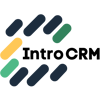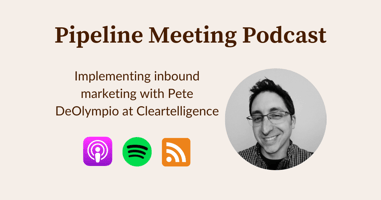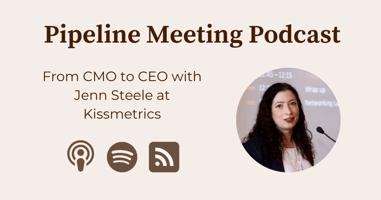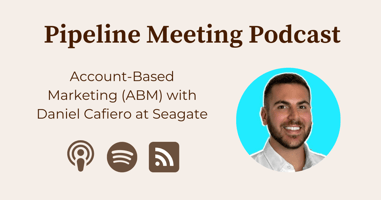Pete DeOlympio just implemented inbound marketing at a professional services firm with over 100...
Virtual events with Emma Biskupiak
Mystery recently raised over 18 million dollars to reinvent virtual events. Their head of brand marketing, Emma Biskupiak, talks about their experiential demos, sales and marketing alignment, and hot topics like Zoom fatigue and quiet quitting.
Show Description
Where B2B marketers come to talk sales. 15-minute interviews published every Monday morning. For heads of marketing and founders who support a sales team.
Subscribe
Popular Platforms
Apple Podcasts
Spotify
Google Podcasts
RSS Feed
Also available:
Amazon | Anghami | Castbox | Castro | Deezer | Overcast | Pandora | PlayerFM | Pocket Casts | Podcast Index | Podchaser | Stitcher | TuneIn
Show Notes
Emma was the first marketing hire at Mystery, and in her time with the company, it has evolved a lot. They've gone from only 10 people to 70 and counting and she shares what she's learned along the way.
- Measuring brand marketing: Never an easy topic, Emma shares how brand is rooted in everything they do and has been from the beginning. There are ways they measure though, like impressions, visits, and through the success of their product and growth marketing teams.
- Why now for virtual events: The company has seen a lot of growth, in part because people are more interested in virtual events than ever. Think Zoom fatigue and quiet quitting being major headlines in the press.
- Demos that don't suck: They make an experiential product. Emma talks about how they've used this to their advantage in the process of introducing new prospects to their product.
- Experience design plus data science: There's an interesting angle they're taking which is bringing principles of data science to make virtual events that scale. Emma explores this.
- Connecting sales and marketing: Sometimes the best way for your sales and marketing teams to talk to each other is for them to... Talk to each other. Mystery uses their own product to bring the two teams together. Learn how it impacts sales and marketing alignment. (Hint: It works!)
Emma Biskupiak on LinkedIn: https://www.linkedin.com/in/ehunsaker/
Learn more about Mystery (now Glue): https://glue.co/
Transcript
Welcome to Pipeline Meeting, where marketers come to talk about sales. Whether you're the head of marketing or a founder who's supporting your first sales hire, we'll talk about qualifying your inbound leads and finding new ones with cold outreach. Learn more at introcrm.com/podcast.
[00:00:20] Harris Kenny: Today we're joined by Emma Biskupiak of Mystery. They're a startup that raised over 18 million dollars, and they're handling virtual events in a really interesting way.
[00:00:29] We talk about providing demos that don't suck, bringing sales and marketing teams closer together, and some topics that you might be seeing a lot on LinkedIn, like Zoom fatigue and quiet quitting.
[00:00:39] Let's get into it.
[00:00:40] Emma Biskupiak: I was the first marketing hire at Mystery, even as a brand marketer. At the time we were only a 10 person company. What I always give the credit to is that our founders from day one saw the ethos of our brand as a potential economic moat.
[00:00:54] Our mission has always been around using technology, and automation technology specifically, to improve connections between people and ultimately make people happier.
[00:01:04] Whether we're selling to people through advertising or we're distributing an ebook to give them more information on a particular topic, we've always been really intentional about leaning into that ethos of our brand and making sure that that's taken into consideration and product development and advertising efforts and generally just crafting our story.
[00:01:26] Harris Kenny: How do you measure impact, but it sounds like, revenue growth, user growth, it sounds like you feel like all of those things are rooted in brand.
[00:01:34] Emma Biskupiak: When I started out, I was at a brand design agency on the marketing side of things. Even then trying to persuade a CPG company, for example, that their visual identity is arguably more important than some sexy Super Bowl advertising opportunity.
[00:01:53] It's always kind of been this uphill battle because it's a lot easier to connect advertising dollars to ROI in the bottom line. A lot of the stuff that brand is, is kind of squishy, right? It's that, how does it make you feel?
[00:02:05] What's interesting, ironically, is what Mystery does is kind of squishy too, right?
[00:02:09] We talk about employee happiness and connections, and historically people haven't been able to connect that to the bottom line. That's what our product does, we measure connection in a way that you can say,
[00:02:20] "Okay, this, this affects your attrition and your, your turnover rate, and all these other factors. That statistically improve a working environment and a company's productivity."
[00:02:31] Similarly though, brand marketing is, really hard to measure sometimes, and people think immediately their mind goes to social media. How many followers do you have? How much engagement do you get?
[00:02:43] Because we do, to your point, step back and kind of make sure that brand is rooted in everything that we do, we can, you know, kind of pat ourselves on the back and be like,
[00:02:53] "Oh yeah, that was the copy that we wrote, on our team," you know?
[00:02:55] There are ways that we track it, and especially as a company that cares deeply about measurement and data. Things like site traffic and A/B testing with different messaging, or ways to track brand marketing efforts. What we do is very in parallel to our product and growth marketing teams.
[00:03:15] There's not ever going to be a growth exercise that doesn't have brand input. There's not going to be a brand exercise that doesn't take into consideration. Feel this? How do we grow this? How do we track this ultimately.
[00:03:26] Harris Kenny: The company is growing a lot. What do you think is driving that?
[00:03:30] I mean, there's a lot of big picture things happening. Of course, all the work that you do is responsible for a hundred percent of it, but outside of , yeah, I mean, I mean I wouldn't imply anything otherwise.
[00:03:40] Emma Biskupiak: Yeah, absolutely. I think the simplest answer is just that there's a need for what we're creating as a company.
[00:03:45] You see headlines all the time right now along the lines of quiet, quitting, and, oh, there's a need for your work, best friend, and I can't tell you the number of Washington Post, or New York Times, higher level publications that, do these like super feely HR leader at mega company's perspective on how they've witnessed remote culture change their team environment.
[00:04:12] And then it almost always ends with, so what do we think technology's going to do to solve for this problem? And it's open ended and I'm just sitting there like, "It's us! It's us! Hey, we're thinking about this differently!"
[00:04:23] But, but it is true the things that those articles touch on two years ago were what we were talking about as a company. Whenever we shifted gears and moved from B2C to B2B, and what it was is we were, you know, at the time, maybe a 12 person company and the pandemic put all of us in this crazy situation where we were like having to work hybrid or remotely.
[00:04:46] We thought about it and we were like, well wait, we've maintained a really strong culture. Granted we're small, that's a, a little bit easier, but what are we doing? Like how do we bottle what we're doing?
[00:04:54] Well, we're already experts in experience design because of our initial product. We already have, these algorithms and dreams for this data science masterpiece someday that'll be able to inform experience design even further.
[00:05:09] So how do we use that to not just totally destroy Zoom fatigue, 'cause this was like June, July of 2020 when everyone was like,
[00:05:18] " How many times are you gonna ask me to stick around until 5:30 on a Thursday and like grab a beverage of my choice and you know, stick around for extra screen time with you. I don't wanna do this."
[00:05:29] All that to say, like people are talking about it, it's been there and we started digging deep a couple years ago and now all of a sudden while we've been kind of doing this work a little bit quietly in the background, just putting our virtual events at the forefront, saying like, Okay, cool.
[00:05:41] Well we know that we can do a really awesome virtual event and we're gonna sell that while we're working. The rest of it. And now we have this amazing platform that informs why and when and what virtual events you should be using.
[00:05:53] Now all of a sudden people are seeing that it's a bigger problem and like, I can't even tell you, I, I wish I could have recorded it two years ago.
[00:05:59] I mean, literal conversations of,
[00:06:00] "Oh my gosh, well, the work environment hasn't changed in decades. When was the last time that anybody ever thought about this?"
[00:06:07] You know what the problems are. But beyond the bandaid solutions, even in person of an after work happy hour, how many people don't drink or have to get home or don't do well in in-person social situations.
[00:06:20] You might leave the office and see those 15 people bonding around the cafe, using the free company beer to bond. But everybody else who walks out that door isn't being included in that morale activity.
[00:06:34] People need what we're creating and whether it's hybrid, virtual, or in-person, people deserve to spend that third of their lives that they work enjoying it.
[00:06:45] Harris Kenny: I was looking at the demo and I was very intrigued. Can you explain to me, I have not participated in your demo process, it just did not feel like so many of these other company demo pages and I, I feel like you have this experience kind of from the get go.
[00:06:59] Can you explain, what it means to experience the demo of, of your process and how you introduce them to your product and why...
[00:07:06] Emma Biskupiak: Yeah, absolutely—
[00:07:06] Harris Kenny: ... Like it doesn't, it doesn't suck, like most demos seem like they suck?
[00:07:10] Emma Biskupiak: Because our product doesn't suck, right? Because like in the same way that we were solving for these virtual events that sucked. We were like, well ours doesn't, so how do we get people to experience that?
[00:07:21] Our first product had this the same problem where it's kind of a mouthful to get the elevator pitch out and once somebody experiences it, they're like,
[00:07:29] "Oh, well yeah, that was, that was amazing."
[00:07:31] They become an evangelist for you. They tell their friends about that experience and they, they immediately wanna do more.
[00:07:38] Don't tell them, show them. It was even a step further than that though.
[00:07:41] A lot of demos, like, especially tech software demos, it's like a walkthrough of a dummy platform and they really lean into the sales pitch.
[00:07:50] We like to think it could be for everyone. Realistically, we know it's not everybody's cup of tea either.
[00:07:55] A lot of people who are really struggling with shifting from the traditional mindset of what you should be doing during your nine to five, those people probably aren't going to get the most out of our product.
[00:08:05] People who really care about their employee happiness, they're gonna join this and be like, Oh, wow, yeah, I was on a call with. 30 people I have never met before from totally different companies.
[00:08:17] And we were all laughing and then breakout rooms where we were experiencing something together. It really is this micro version of what we can do for companies.
[00:08:26] We started them when it was only two of us on the marketing team. It was an extremely manual process because we also had a much smaller engineering and product team at the time. So we couldn't immediately go them and say, brilliant people, this amazing product that you're building and create like a demo platform for us.
[00:08:44] It was super manual, me from my Gmail sending hundreds of invitations to people.
[00:08:49] But we were able to prove it out almost immediately.
[00:08:51] They're pretty lofi because we've found that, uh, getting right to the root of what we do, which is connection and showing that you can create those connections without all the frills and the bells and whistles. That's the science that we put our energy behind.
[00:09:05] So you join and you have this mini experience, and then there's Q and A at the end.
[00:09:10] We do have a member of a sales team join just to answer some of the questions so that our hosts don't have to know all the ins and outs and the details. Then afterwards, if you want more information, are you ready to purchase?
[00:09:21] You can either go straight through our self-serve flow and book an event for yourself, or you can follow up with a sales team member for more information or to discuss, you know, the platform benefits.
[00:09:30] It's really successful for us. We like that there's proof in the pudding.
[00:09:34] Harris Kenny: Have you ever heard of a museum or, I guess that's like, that's a whole other question, but an exhibit thing called Meow Wolf.
[00:09:41] Emma Biskupiak: I have, yeah, down in Santa Fe, right?
[00:09:44] Harris Kenny: Yeah. Yeah. I may have one in Denver. Yeah, and one in Vegas. To me, hearing you talk about the product and being on the site, to me it feels more experiential, than it feels like a meeting.
[00:09:59] Is that right? Am I getting the vibe?
[00:10:02] Emma Biskupiak: Oh, absolutely. Yeah. I'd say that our two pillars are really experienced design and data science and using the combination of those things to create stronger connections.
[00:10:14] It's not just this space filler of,
[00:10:16] "Oh, I'm supposed to spend this morale budget by the end of the year."
[00:10:20] It's are you trying to work on new hire integration? Do you have really strong intra-team connections, but cross team collaboration is really poor. Do you have limited exposure to leadership?
[00:10:31] Okay. Let's identify what those things are that you're trying to work on. We have tools that can do that with our insights tool.
[00:10:38] But even somebody coming to us for their first experience and saying like, Hey, we have 30 interns starting next week, all virtually, we don't know how to create that experience in a way that's gonna make them super excited and wanna sign on for full-time roles at the end of their internship. What can I do?
[00:10:55] We take the data element and we integrate it with this experience design, and then you have that, that same experience. We might say, Yeah, do this paint and sip class with this, this host, but because we let them know that there's this inside joke with the interns already. They're gonna show up and they're gonna be painting whatever that visual representation is of that inside joke and like, that's gonna resonate so much more.
[00:11:21] The chat box is gonna be popping off and nobody's gonna be on mute. They're gonna have a great time. And ultimately, you're gonna achieve that, that connection goal in a way that you wouldn't have otherwise potentially.
[00:11:34] Harris Kenny: Is there anything else that you're working on that's exciting or anything else that's new?
[00:11:37] Emma Biskupiak: I think it's been a really interesting exercise in using our own product because so often you do see sales and marketing.
[00:11:46] Everybody's had that relationship with somebody on the opposite team where you're like, "They're just not giving me the right leads."
[00:11:52] And then we're saying, "Well, they're just not even telling me whenever they get the lead from the thing that I sent them, they're not joining the demos that I set up for them. So how are they supposed to have those conversations?"
[00:12:02] It's interesting 'cause we call it Mystery at Mystery, we use our own product and we focus on cross team collaboration because in my opinion, the brand side of marketing specifically, we create the messages that then the rest of the marketing team takes out to the world.
[00:12:15] And if we don't know what resonates, like, what's that aha moment when a salesperson is giving a sales pitch or whenever they're, um, on a call and they're clicking through a presentation, you can visually see or you can audibly hear.
[00:12:29] Sometimes that moment when someone's like, "Oh, that's what you do."
[00:12:34] Stop right there as a salesperson. Make note of that. Grab a snapshot. Like what was that moment and how do I work that end of things.
[00:12:41] On the reverse side of that, what's the sticky thing? What's the thing that you had to go over five different ways before you were ultimately like, "Oh, actually just don't even worry about that.
[00:12:50] I think we're getting too in the weeds." Let's, let's pull that back out.
[00:12:54] There's so much value in that relationship and it's been really cool because as our sales and marketing teams have grown, I think I've seen probably the most fruitful sales and marketing, all up demand, relationship I've ever been a part of.
[00:13:08] It's just a testament to like why we're building what we build.
[00:13:12] Harris Kenny: It's an interesting different way of getting at that sales marketing alignment gap.
[00:13:16] Oh, maybe it's the technology. Maybe it is CRM and the automation platform need to talk better together. Maybe we need to bring a new manager in who's more experienced, but, sounds like you're saying, maybe these teams just need to talk to each other more...
[00:13:28] Emma Biskupiak: --yeah--
[00:13:29] Harris Kenny: ... and just literally get to know each other a little bit better.
[00:13:32] Emma Biskupiak: Exactly, and like it's, you could be in an event where, You don't talk about work once, but you realize that like you and this person have this thing in common. And because you maybe like the same TV show, you're like, You know what? We've never had a one on one. Let's do like a 15 minute coffee, 30 minute coffee, virtual one on one next week.
[00:13:56] And because you're not on the same team or you're not in a physical office where you're bumping shoulders with people or grabbing coffee at the same time, you otherwise might not have had that experience to make those connections and realize that you had so much in common with this person.
[00:14:09] But now the next time you go into a meeting with that person where you might only strictly talk about work, you have this level of trust. Your guards down. That much more, you know, and it, it might have started by recognizing that you both like this TV show, but then where you end up is you're thinking,
[00:14:26] "Oh yeah, I, I know this person. I know that if they have a different opinion for me in this meeting, it's probably not coming from this malicious place of I wanna be right. And I know that you're wrong."
[00:14:35] It's because you trust them to be working towards the same goal and that they truly believe that that's the way to get there.
[00:14:41] And regardless of where that nets out, you can at least have a healthier place to dive in deeper.
[00:14:52] Harris Kenny: I love that. That's so good. Where can people find you if they're like, Emma's brilliant. I want more of Emma's thoughts on any, anything I can find. Where can people find your stuff?
[00:15:04] Emma Biskupiak: I'm trying to work on self love, so I will take that and I will say thank you for thinking that after hearing me ramble. Connect with me on LinkedIn, it's Emma Biskupiak, uh, which is a mouthful, but I'm the only Emma at Mystery right now. I'm also emma@trymystery.com if you wanna email me.
[00:15:22] Please don't spam me with stuff, I already get a lot of that 'cause my name's on the press releases. Also, I make a cameo on our TikTok every once in a while, so you can see me there..
[00:15:32] Harris Kenny: Okay. Okay. I love it. Thank you so much for your time. I really appreciate it. This was a lot of fun.
[00:15:37] Emma Biskupiak: Thank you so much. It was fun to talk about it.
That's all for now. You can find show notes at introcrm.com/podcast. The theme music for Pipeline Meeting is by Neighbourhood Vandal and it's shared under a Creative Commons-Attribution, or CC-BY, license. If you learned something, consider sharing this show with a friend. Thanks.



